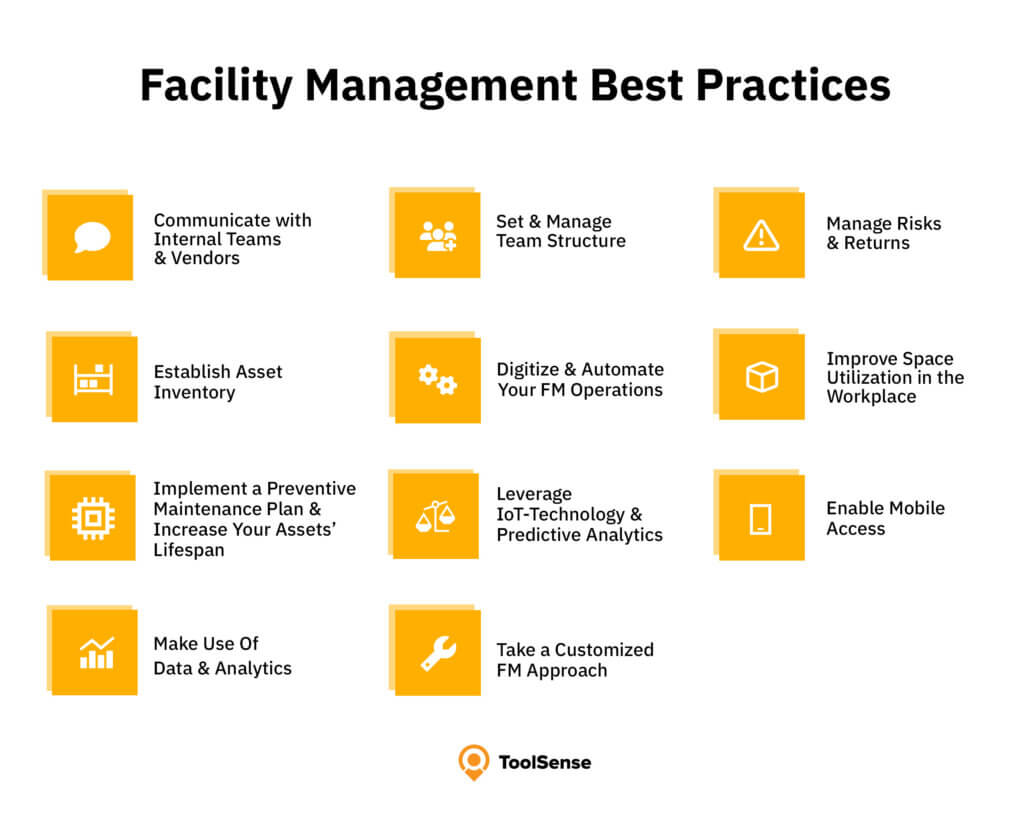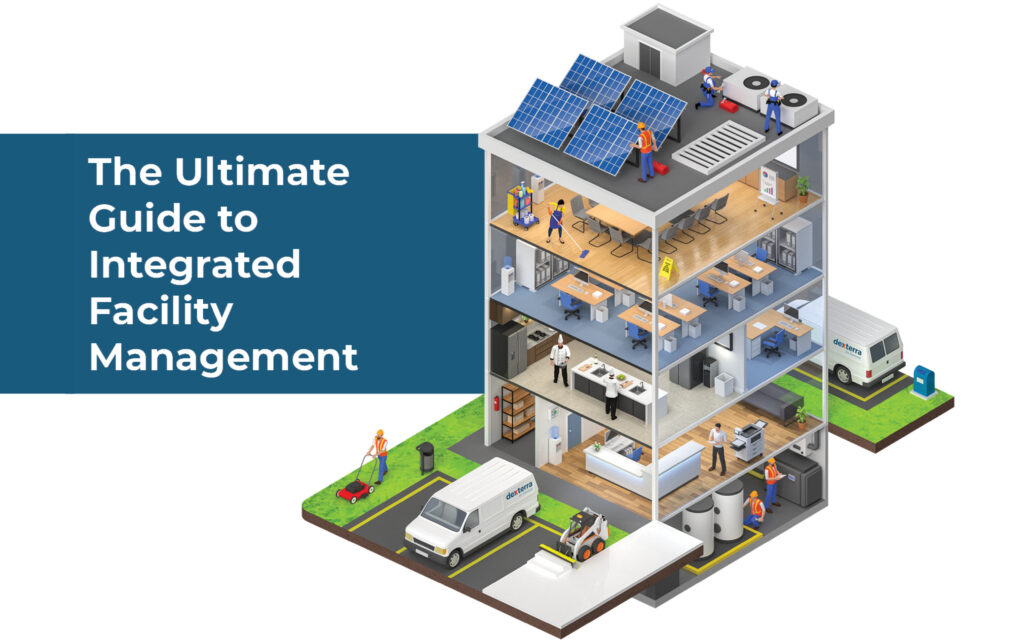How Total Facility Management Improves Business Performance and Operational Success
How Total Facility Management Improves Business Performance and Operational Success
Blog Article
Top Benefits of Total Facility Management for Streamlined Procedures
Total Facility Management (TFM) represents a calculated technique to improving functional effectiveness by integrating various services, such as maintenance and security, under a unified management structure. This debt consolidation not just lessens redundancies however likewise leverages data analytics for informed decision-making and anticipating upkeep. TFM assists in streamlined communication amongst stakeholders, lining up operations with more comprehensive business goals. The inquiry stays: what particular benefits can companies harness from adopting TFM, and just how might these benefits change their operational landscape?
Boosted Operational Performance
Enhanced functional efficiency is a main advantage of executing total facility management (TFM) approaches. TFM includes a thorough method to taking care of a facility's resources, procedures, and infrastructure, eventually simplifying operations. By combining numerous solutions-- such as maintenance, space, safety, and cleansing management-- TFM minimizes redundancies and improves control among different operational functions.
The combination of modern technology more magnifies this effectiveness. Advanced facility management systems offer real-time data analytics, allowing facility supervisors to make informed decisions that enhance process and resource allocation. Predictive maintenance strategies, as an example, expect equipment failures before they occur, decreasing downtime and prolonging possession life expectancy.
Furthermore, TFM promotes standardized processes across numerous divisions, making certain uniformity and high quality in service shipment. This uniformity reduces functional disturbances and cultivates a much more collective working environment. Therefore, staff members can concentrate on their core responsibilities, driving efficiency and improving overall performance.

Expense Decrease and Financial Savings
Executing total facility management (TFM) not only enhances operational efficiency yet also dramatically adds to cost decrease and savings. By combining numerous services under a single management structure, organizations can remove redundancies and streamline processes, therefore decreasing functional prices. TFM enables much better purchase strategies, enabling firms to negotiate bulk acquiring arrangements with suppliers and company, leading to lower costs.
Additionally, TFM stresses preventive maintenance, which reduces unforeseen failures and expands the lifespan of crucial devices. This positive strategy not just lowers repair costs but also enhances the dependability of facilitiess, guaranteeing undisturbed procedures. In addition, power performance efforts, commonly a vital emphasis of TFM, bring about significant financial savings on energy expenses, as facilitiess are optimized for decreased energy consumption.
Improved Source Management
Reliable source management is a foundation of total facility management (TFM), allowing organizations to optimize the use of their assets and labor force. By applying TFM approaches, companies can thoroughly assess their source appropriation, making certain that every property is used efficiently and effectively. This all natural strategy enables the identification of underperforming sources and the capacity for reallocation or enhancement.
On top of that, TFM assists in the additional reading combination of technology for real-time surveillance of resources, which aids in forecasting maintenance demands and stopping costly downtime. By leveraging information analytics, companies can make informed choices about source implementation, ultimately boosting productivity and reducing waste.
In addition, here TFM promotes a society of constant renovation, encouraging groups to regularly assess and improve their resource management practices. Total Facility Management. This positive stance not only decreases operational disturbances but additionally fosters development, as staff members are empowered to recommend improvements based on their direct experiences with resource use
Streamlined Interaction Channels
In total facility management, streamlined communication networks play an essential duty in fostering partnership and performance throughout teams. Efficient interaction ensures that all stakeholders, including facility supervisors, upkeep staff, and service suppliers, are straightened with functional requirements and organizational goals. By establishing clear lines of interaction, groups can promptly address issues, share updates, and carry out remedies, thereby minimizing downtime and improving efficiency.
With streamlined interaction systems, details is conveniently obtainable, permitting real-time updates on maintenance requests, resource allocation, and project timelines. This transparency not only reduces misunderstandings but likewise Click This Link equips workers to make educated decisions rapidly. Additionally, streamlined communication helps with better coordination during emergency situations, ensuring that all employees are educated and can react without delay.

Boosted Focus on Core Activities
A key advantage of total facility management is the increased focus on core activities, enabling companies to concentrate on their main organization objectives - Total Facility Management. By outsourcing non-core functions such as upkeep, security, and cleaning, companies can redirect their resources and energy towards tactical efforts that directly contribute to their competitive advantage and growth
Total facility management integrates various operational jobs under a solitary umbrella, cultivating performance and decreasing redundancy. This consolidation not only streamlines procedures yet additionally boosts liability, making certain that every facet of the facility operates harmoniously without drawing away focus from what absolutely matters-- core organization features.
Moreover, this method enables employees to dedicate their effort and time to jobs that drive advancement and improve customer satisfaction, instead than obtaining slowed down by operational obstacles. With a trusted facility management companion managing daily operations, companies can accomplish greater dexterity, respond swiftly to market adjustments, and keep a sharper focus on their mission.
Eventually, increased focus on core tasks causes improved total performance, enabling organizations to enhance their market placement and satisfy their strategic objectives better. - Total Facility Management
Conclusion
Finally, Total Facility Management dramatically enhances functional performance by combining crucial services and leveraging data analytics for educated decision-making. Cost reductions and boosted source management contribute to general financial savings, while streamlined communication networks foster cooperation among stakeholders. By enabling companies to concentrate on core activities, TFM not only enhances performance yet also enhances market positioning. The assimilation of these advantages underscores the significance of TFM in accomplishing lasting functional excellence.
Total Facility Management (TFM) represents a strategic method to improving operational efficiency by integrating various services, such as maintenance and security, under a unified management structure.Boosted functional effectiveness is a main benefit of executing total facility management (TFM) methods. Advanced facility management systems offer real-time data analytics, enabling facility supervisors to make educated decisions that boost process and resource allotment.Executing total facility management (TFM) not only enhances functional effectiveness however also significantly adds to set you back reduction and savings.Reliable resource management is a keystone of total facility management (TFM), allowing organizations to maximize the use of their assets and labor force.
Report this page